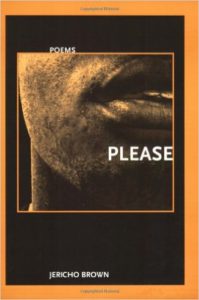Please
 by Jericho Brown,
by Jericho Brown,
Western Michigan University, 2008,
69 pages, paper, $14.00,
ISBN–10: 1–930974–79–5
Buy the Book
In the same way that music hits you straight in the heart, the solar plexus, the guts, Jericho Brown’s poems in Please take direct aim. The poems in this stunning first collection by this talented new poet are risky, beautifully crafted, and deeply felt. At times while reading it, I found myself gasping, or humming, or simply struck profoundly by the emotions.
Please explores the intersection of life where love and violence intermingle. In this exploration, Brown uses the framework of music to spotlight moments in history and culture that surround African American /male identity and sexuality. The use of music works on many levels in this book. The overall organization of the book is that of an album or CD, complete with poems mimicking musical tracks and liner notes at the end.
The sections of the book also reflect a CD player or iPod: “Repeat,” “Pause,” “Power,” and “Stop.” (“Stop” is not an actual section with poems in it, but simply a direction.) And the language itself in the individual poems is lyrical, all adding up to the book’s compelling strength.
Under the umbrella of the musical structure, several themes weave themselves throughout this work: family, love in its many forms, and violence or hurt. While these are not new themes in poetry, Brown’s treatment of them through the lenses of race, culture, and a myriad of voices and points of view give the work a freshness and muscularity.
We hear the voices of various R&B and pop singers such as Diana Ross (“Track 4: Reflections” 11), and Janis Joplin, (“Track 5: Summertime” 19). But besides giving us the voices of the singer, Brown also gives us historical context, as in the Track 4: Reflections Diana Ross poem:
I could hear the sun sing in 1968.
I learned the word assassin
And watched cities burn.
Got another #1 and somebody
Set Detroit on fire. That was power —
White folks looking at me
Directly and going blind
We also hear the voices of grandmothers, fathers, sons, and even crickets and burning bushes. In each of the three sections, Brown also includes the Wizard of Oz’s three famous travelling companions, the scarecrow, tin man, and lion. We hear the voices of the African American culture, of what it’s like to be a gay man growing up and the anguish and violence associated with that.
Complex emotions intertwine throughout the book. In “Prayer of the Backhanded” (8), which appears near the beginning of the book, it describes abuse:
Father, I bear the bridge
Of what might have been
A broken nose. I lift to you
What was a busted lip.
Then near the end, another poem “Like Father” describes the coming out experience:
My father’s embrace is tighter
Now that he knows
He is not the only man in my life.
The poems are gritty, hypnotic, and dangerous, all of which makes these poems incredibly satisfying to read. It is clear that throughout the book, the author’s intention was not to hold anything back. In an interview in Critical Mass, the blog of the National Book Critic’s Circle Board of Directors, Brown articulates this intention. “My only goal is to write poems that take risks in their form and their content. I have always been attracted to work that manages to say what may be thought unsayable, poems that make clear the vulnerability of the poet to his or her work.”
The Jan/Feb 2009 edition of Poets & Writers Jericho Brown is highlighted among 12 debut poets of 2008. At only 25 years old, he’s worth watching, paying attention to, and especially, reading.
— Michelle Demers

